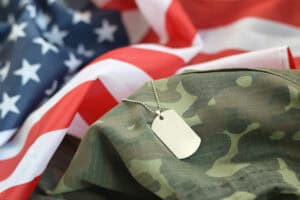A peer-run support group is taking its local impact to the next level with Veterans on Board, an organization designed to find housing and job opportunities for former service members.
The group that began in summer 2014 as the VA-trained Fredericksburg Area Veterans Peer Support Group, then rebranded as Veterans Helping Veterans, is beginning the process to becoming a nonprofit organization while simultaneously furthering partnerships and programs for former service members.
Veterans on Board is about helping veterans in any way that we can, be it with housing, food, trying to help them find jobs, getting them back and forth to doctors appointments and getting their claims processed [through the Department of Veterans Affairs], co-founder and treasurer Brad Largent said.
Largent, along with founders Jim Doty, Norris Hassell and Nathaniel Singleton, found Veterans on Board to be a natural progression for the organization that began as a weekly support group for former service members with post-traumatic stress disorder or other combat-related mental health challenges.
We had a lot of people showing up that were living on the streets, and theyre hungry, Largent said, so we decided we wanted to find a way to get them off the street and get some food in their bellies. Because you cant help someones head if theyre hungry[they] want to eat first.
That expanded mission, to help veterans better adapt to the community, has meant up to 40 hours of work per week for members creating relationships with entities like Quin Rivers and the Virginia Employment Commission.
These partnerships have led to housing for five homeless veterans, resources for jobs and the installation of Deborah Franks, founder of the nonprofit thrift store MANARC, Borne the Battle, as executive director.
We try to refer them to as many different places as we can, Largent said, and then pick up the slack on what nobody else can help with.
The Hire a Hero program is one way Veterans on Board seeks to pick up that slack. For $25 an hour, the group will send one or two veterans out to rake your leaves, clean your gutters, whatever you need done, according to Largent.
Veterans receive $10 per hour of work; the remainder goes back into the organization.
Robert Moore, a Marine veteran who had been living in his truck, then a tent, credited Veterans on Board and Maria Wyatt at Quin Riversthe groups secretarywith getting him into housing.
They talked to the right people, he said. It keeps me from freezing.
Hassell, the groups president, said members still attend weekly support group meetings to keep up preventive maintenance as the group seeks legitimization.
Veterans on Board is actually us incorporating structure, Hassell said. Before, we were limited in what we could or couldnt do.
[Veterans on Board] is going to play a great part locally, said member Al Fulgham, and its only growing.
Going forward, Executive Director Deborah Franks said the group will need to tackle one problem at a time to realize their long-term goal.
Eventually, she said, Veterans on Board wants to get at least 80 percent of the areas homeless veterans off the street and into housing and employment.
This is my hometown, and I think veterans have the right to deserve everything thats offered to them. We need to reach out and find these individuals and get them off the street and have them feel valued, Franks said. Im confident that well be able to make that happen.





